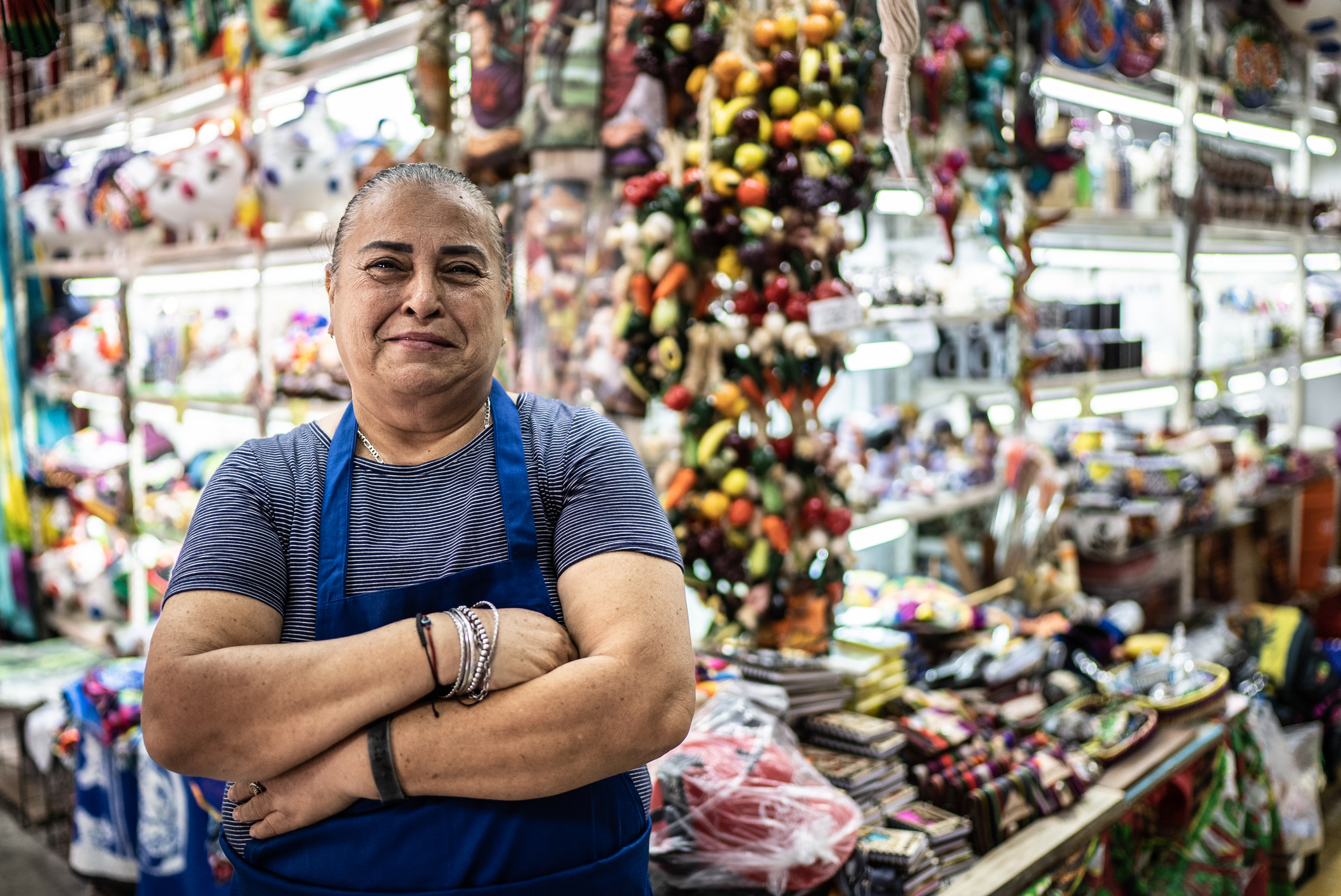
Business as Usual: Latina Entrepreneurs in California Navigating the Postpandemic Economy
Introduction
California is home to one of the largest and most diverse small business sectors in the nation.1 The state is home to more than 4.3 small businesses, providing more than 7.6 million jobs and accounting for more than 47% of the state’s private workforce.2 Women-owned businesses are a cornerstone of California’s economy, accounting for about 44% of all small businesses in the state.3 These small businesses are central to California’s economy, sustaining livelihoods for families and communities across the state. Women-owned small businesses, and Latina-owned firms in particular, play a vital role but often encounter distinct challenges in securing financing, recovering from economic disruptions, and planning for long-term stability.
This data brief draws on UCLA LPPI’s 2022–2023 state survey of small business owners in California to examine how Latina entrepreneurs navigate capital access, pandemic recovery, disaster preparedness, and sustainability planning. The reference period overlaps with the most recent public data available from the U.S. Census Bureau and the U.S. Small Business Administration, providing a timely baseline at a moment when official statistics have yet to fully reflect postpandemic conditions.4 While not statistically representative, the sample was designed to center on underrepresented entrepreneurs. This brief compares Latina, white, and all women-owned businesses in the California sample (see Appendix 1 for details). The data show that Latinas face greater barriers to capital and resilience planning than their peers.
Why Pandemic Trends Still Matter Now?
Research has shown that minority entrepreneurs are less likely to be approved for loans than equally creditworthy counterparts.5 When loans are approved, they often carry higher interest6 rates and their loan size is smaller,7 particularly for Black business owners.8 These financing gaps can limit their opportunities to grow, weather economic downturns, and reinvest in their communities. The COVID-19 pandemic further exposed and deepened these challenges. Early rounds of the Paycheck Protection Program, the primary federal relief effort for small businesses, failed to reach many smaller firms and disproportionately missed minority and women-owned businesses.9 Women-owned firms also experienced larger drops in sales than male-owned businesses.10 Limited access to this critical relief slowed recovery and left many small women-owned firms more financially vulnerable during this period of severe disruption.
Today, small businesses are navigating new pressures from rising costs and increasingly severe weather events such as floods and heat waves. A Federal Reserve survey found that by 2020, one-third of businesses had already observed climate-related impacts on revenues, costs, or investments, and most expected these impacts to grow.11 These impacts can heavily impact small entrepreneurs with fewer financial resources to implement sustainability measures or recover from disasters. Despite these challenges, most research on environmental risks focuses on large corporations, offering little insight into how small, women-owned businesses approach disaster preparedness and long-term planning. Studies abroad suggest that access to sustainable practices and strong regulatory enforcement can spur small businesses to adopt greener practices (e.g., increased recycling),12 but U.S. research remains limited. Filling this gap is critical: how Latina entrepreneurs navigate both financial and climate pressures is key to building California’s long-term economic resilience.
Key Findings
Key finding 1: Access to sufficient and affordable financing remains a top challenge for Latina-owned businesses in California.
Prior to the COVID-19 pandemic, nearly half (45%) of surveyed Latina-owned businesses reported difficulty accessing capital, a share higher than that for all women-owned businesses (40%) and nearly double the share for white women-owned businesses (26%). Figure 1 shows that, among surveyed small businesses that faced challenges accessing capital, the most common barrier was insufficient funding, reported by about two-thirds of Latina-owned firms (70%) and a similar share of white women-owned firms (67%). Among these barriers, the largest disparity between Latinas and white women was in credit scores: 48% of Latina-owned businesses cited low or poor credit as a barrier, more than twice the rate of white women-owned businesses (18%). Latinas were also more likely to report unaffordable interest rates (63% vs. 55%). More Latinas also identified personal savings as the most common source of startup funding compared to white-owned businesses and all women in our sample (63%, 57%, and 59% respectively). Overall, these findings indicate that Latina-owned businesses face greater barriers to securing sufficient and affordable capital for their businesses compared to white women-owned businesses.
Figure 1. Capital Access Barriers Reported by Women-Owned Businesses in California
Source: LPPI analysis of original survey data collected by WestGroup Research from November 2022 to September 2023. Asked only of respondents who reported facing challenges obtaining funding/capital for their business. Multiple answers allowed; shares are based on the number responding yes/no to each challenge, excluding NA.
Key Finding 2: Latina-owned businesses were hit harder by the COVID-19 pandemic and remained more financially vulnerable after the crisis.
We asked respondents to describe the impact COVID-19 had on their small businesses. Nearly two-thirds of surveyed women-owned businesses said the pandemic negatively affected their operations, and less than one-fifth (16%) reported a positive impact. As shown in Figure 2, 35% of Latina-owned firms reported a large negative effect from the pandemic, compared to 26% of white women-owned firms.
Further, while 76% of women-owned businesses sought federal, state, or local relief during the pandemic, one in three still anticipated needing additional financial support in the six months following the survey. Latina-owned firms were especially vulnerable, with 35% anticipating future need—double the rate of white women-owned businesses (17%). Together, these findings highlight the depth of pandemic-related losses, underscore that relief programs were insufficient to stabilize many small firms, and point to the persistence of financial fragility, particularly among Latina entrepreneurs.
Figure 2. Pandemic Impacts and Recovery Needs Reported by Women-Owned Businesses in California
Source: LPPI analysis of original survey data collected by WestGroup Research from November 2022 to September 2023. Respondents were asked: “Please indicate the extent to which the pandemic has impacted your business” (share reporting a “Large negative effect”) and “In the next six months do you think your business will need to do any of the following?” (share indicating “Obtain financial assistance or additional capital”).”
Key Finding 3: Digital adoption patterns differ for Latina-owned businesses, exposing them to both growth opportunities and heightened risks.
Digital tools were a critical lifeline for small businesses during COVID-19, helping them sustain operations amid shutdowns and disruptions.13 Many adopted new digital technologies not only to maintain existing practices but also to develop new products or services and to replace established ones with digital alternatives.14 Yet not all women-owned businesses were able to take advantage of these tools. According to our survey, while almost all women-owned businesses reported having internet access at their place of business, 23% conducted none of their sales online.
Most businesses with an online presence relied on e-commerce platforms, including 68% of Latina-owned firms and 71% of women-owned businesses (see Figure 3). Latina entrepreneurs, however, were somewhat more likely to rely on social media (32%) compared to white women (25%) and all women in our sample (29%). Social media platforms are often more affordable and flexible, but they also tend to be more vulnerable and less secure or stable compared to e-commerce sites. Reflecting these risks, nearly one in five surveyed businesses (19%) reported experiencing a cybersecurity attack. Previous UCLA LPPI research has found that such attacks occur at higher rates among California’s ethnic minority-owned small businesses.15
Figure 3. Online Sales Platforms Reported by Women-Owned Businesses in California
Source: Source: LPPI analysis of original survey data collected by WestGroup Research from November 2022 to September 2023. Respondents were asked: “What is the primary platform you use for online transactions?”
Key Finding 4: Climate Change as a Business Priority Reported by Women-Owned Businesses in California.
Surveyed women entrepreneurs were asked whether climate change, defined in the survey as increased vulnerability to wildfires, drought, and extreme weather events had affected their firm’s revenues, costs, investments, or worker safety. Nearly 26% of respondents reported that climate change had already created observable impacts. Looking ahead, just more than half (51%) anticipated future impacts on their business operations. Further, about 43% of surveyed Latina-owned businesses ranked climate change as a high or medium business priority, compared to just 30% of white women-owned firms (see Figure 3). This stronger perception among Latinas may suggest a heightened awareness of how climate risks could affect their ability to sustain and grow their businesses. This pattern is consistent with LPPI’s broader research on California small businesses, which found that many surveyed small businesses remain vulnerable to future crises.16
Figure 3. Climate Change as a Business Priority Reported by Women-Owned Businesses in California
Source: LPPI analysis of original survey data collected by WestGroup Research from November 2022 to September 2023 to the following question: “Relative to other business risks, what level of priority would you give to risks arising from climate change?” (share reporting high or medium priority).
Key Finding 5: Most women-owned businesses have at least one disaster safeguard, but comprehensive preparedness remains limited.
We asked women-owned businesses in California about uptake in three common emergency preparedness measures: insurance coverage (e.g., flood, earthquake, or fire), structural protections of their business (e.g., flood- or wind-proofing), and access to a back-up generator to maintain operations in case of power outage. Figure 5 displays the share of all women, Latina-, and white-owned businesses without each safeguard. Among these safeguards, facility proofing was the least implemented emergency preparedness measure, with nearly 80% of all women in our sample reporting they did not have it in place.
Creating a combined indicator, we found that 77% of women-owned businesses surveyed had at least one safeguard in place, with 77% of Latina owners reporting the same, and white women owners reporting at a higher rate (85%). However, relatively few businesses reported multiple protections: 43% had just one safeguard, while only 8% had all three. These findings suggest that, while most women-owned businesses have taken at least some steps toward disaster readiness, large gaps remain in the breadth of their preparedness. The limited adoption of multiple safeguards underscores continued vulnerability to climate-related disasters and other crises, particularly for smaller firms with fewer resources to invest in resilience.
Figure 5. Share of Women-Owned Businesses Without Disaster Protections in California
Source: LPPI analysis of original survey data collected by WestGroup Research from November 2022 to September 2023 to the following questions: “Do you have flood, earthquake, or fire insurance for your business?”; “Have you taken action to flood-proof or wind-proof your facility?”; and “Have you obtained a generator(s) for your business if electrical power fails?”
Note: “No” and “Not sure” responses are combined since both indicate lack of confirmed preparedness.
Key Finding 6: Despite financial barriers, Latina-owned businesses demonstrate stronger intent to pursue sustainability planning.
About one in three women-owned businesses in California reported a “very good” understanding of how environmental sustainability practices affect their operations, with little variation by race. A similar share (28%) already had a plan in place or in development, while roughly 42% reported no anticipated need (Figure 6). Looking ahead, however, Latina-owned businesses were more likely than white women (31% vs. 22%) to express intent to develop a plan in the future. The most frequently cited obstacle to sustainability planning was cost, underscoring how financial constraints prevent many women-owned businesses from pursuing these practices.
Figure 6. Sustainability Planning and Intent Reported by Women-Owned Businesses
Source: LPPI analysis of original survey data collected by WestGroup Research from November 2022 to September 2023, to the following question: Which of the following best describes your business’ position regarding having a formal environmental sustainability plan? May not add to 100 due to rounding.
Conclusion
This data brief highlights both persistent barriers and emerging priorities for Latina entrepreneurs in California. The findings show that Latina business owners reported greater difficulty securing affordable capital prior to the pandemic, more severe pandemic impacts, and higher anticipated needs for further assistance. At the same time, they were more likely to view climate change as a business priority and express intent to develop a sustainability plan in the future. These findings illustrate both the challenges that constrain Latina-owned businesses at a higher rate than white women-owned businesses and their drive to engage in sustainable business practices when given adequate resources. Supporting the resilience of women-owned businesses is important for ensuring the long-term economic viability of the state’s economy. To ensure that California continues to be home to the largest share of small businesses per state, policymakers need to ensure that all women-owned businesses are supported through targeted investments, accessible capital, and culturally relevant resources. By implementing evidence-based policy interventions that help small businesses thrive in today’s uncertain economy, policymakers can ensure not only California’s economic vitality but also strengthen its resiliency for any future economic crisis
End Notes
1 U.S. Small Business Administration, 2024. Office of Advocacy, “New Advocacy Report Shows Small Business Total Reaches 34.8 Million, Accounting for 2.6 Million Net New Jobs in Latest Year of Data,” press release, November 19, available online.
2 U.S. Small Business Administration, 2025. 2025 Small Business Profile: California (June),
available online.
3 Ibid.
4 For public dataset on small businesses, see.
5 Timothy Bates and Alicia Robb.2015. “Has the Community Reinvestment Act Increased Loan Availability among Small Businesses Operating in Minority Neighbourhoods?” Urban Studies 52, no. 9 (July 1): 1702–21, available online.
6 Timothy Bates and Alicia Robb. 2013. “Greater Access to Capital Is Needed to Unleash the Local Economic Development Potential of Minority-Owned Businesses,” Economic Development Quarterly 27, no. 3 (August 1): 250–59, available online.
7 Timothy Bates and Alicia Robb. 2016. “Impacts of Owner Race and Geographic Context on Access to Small-Business Financing,” Economic Development Quarterly 30, no. 2 (May 1): 159–70, available online.
8 Ibid.
9 Anneliese Lederer and Sara Oros. 2020. Lending Discrimination within the Paycheck Protection Program. National Community Reinvestment Coalition, available online. Sergey Chernenko and David Scharfstein. 2024. “Racial Disparities in the Paycheck Protection Program,” Journal of Financial Economics 160:10391, October 2024, available online.
10 Nicholas Bloom, Robert S. Fletcher, and Ethan Yeh. 2021. The Impact of COVID-19 on US Firms, NBER Working Paper No. 28314. National Bureau of Economic Research, January, available online.
11 Hishgee Jargalsaikhan, Sylvain Leduc, and Luiz E. Oliveira. 2022. Appendix: Business Survey on Climate-Related Risk. Federal Reserve Bank of San Francisco, March 21, available online.
12 Ibid.
13 Craig Parker, Scott Bingley, and Stephen Burgess. 2023. “The Nature of Small Business Digital Responses during Crises,” Information and Organization 33, no. 4 (December 2023): 100487, available online.
14 Wanda J. Orlikowski and Susan V. Scott. 2021. “Liminal Innovation in Practice: Understanding the Reconfiguration of Digital Work in Crisis.” Information and Organization 31, no. 1 (March 2021): 100336, available online.
15 Rosario Isabel Majano, Silvia R. Gonzalez, Julia Silver, Paul M. Ong, Julia Hernandez Nierenberg, Chhandara Pech, Jennifer Uribe, Juan Carlos Ruiz Malagon, and Sonja M. Diaz. 2023″Business as Usual: Entrepreneurs of Color in California Face Challenges in Technology, Climate Change, and Sustainability in a Post‑COVID Economy.” UCLA Latino Policy and Politics Institute, November 2, available online.
16 Vivian Vanessa Cruz, Julia Silver, and Silvia R. González. 2024. “5 Facts to Strengthen Resilience for California’s Small Businesses,” UCLA Latino Policy and Politics Institute, October 9, available online.
Acknowledgments
This data brief is a part of a series made possible with the generous support of JP Morgan Chase Global Philanthropy, the James Irvine Foundation, and the Latina Futures 2050 Lab. The California Legislature and the California Latino Legislative Caucus provide core operating support for the UCLA Latino Policy and Politics Institute.
The research team acknowledges its longstanding partnership with the UCLA Center for Neighborhood Knowledge and appreciates the insights and guidance provided by Chhandara Pech and Dr. Paul M. Ong. We also thank LPPI staff—Misael Galdámez, Dr. Silvia R. González, Yina Marin, and Miriam Torres.
The Latino Policy and Politics Institute at UCLA acknowledges the Gabrielino/Tongva peoples as the traditional land caretakers of Tovaangar (the Los Angeles basin and Southern Channel Islands). As a land grant institution, we pay our respects to the Honuukvetam (Ancestors), ‘Ahiihirom (Elders), and ‘Eyoohiinkem (our relatives/relations) past, present, and emerging.
About LPPI
The UCLA Latino Policy and Politics Institute addresses the most critical domestic policy challenges facing Latinos and other communities of color through research, advocacy, mobilization, and leadership development to expand genuine opportunity for all Americans.
Disclaimer
The views expressed herein are those of the authors and do not necessarily reflect those of the University of California, Los Angeles, as a whole. The authors alone are responsible for the content of this report.
© August 2025 by the Regents of the University of California, Los Angeles. All rights reserved. Printed in the United States.














